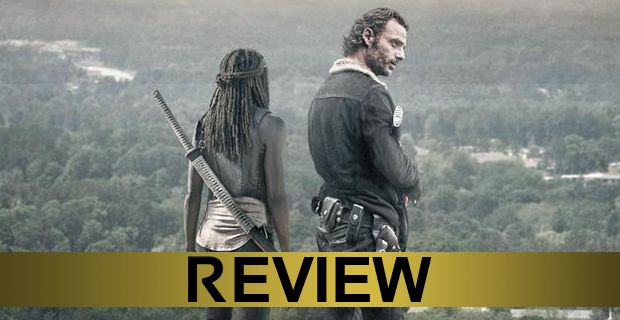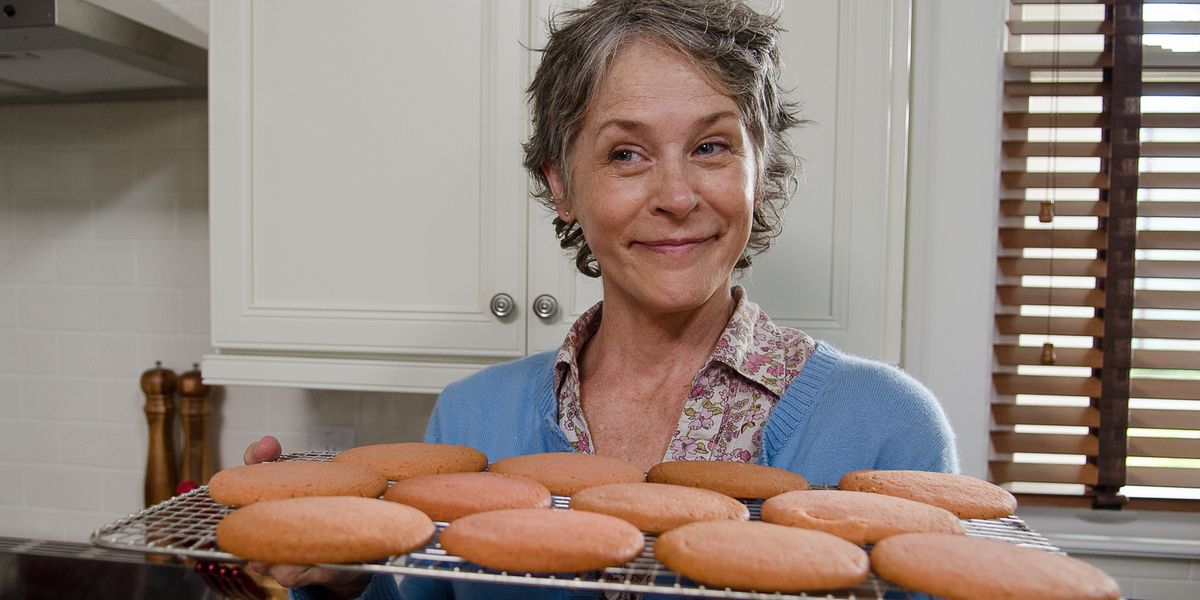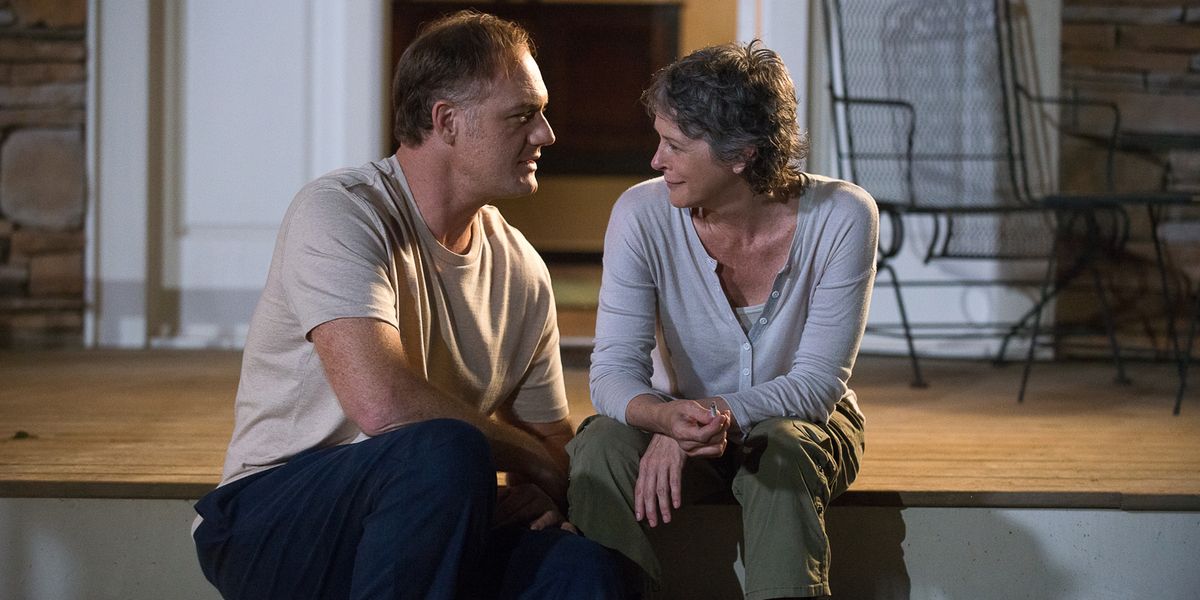[This is a review of The Walking Dead season 6, episode 12. There will be SPOILERS.]
-
The Walking Dead is built on the idea that the post-zombie world is a violent, dog-eat-dog world. It is an unpleasant side effect of there no longer being much of a society left, just a random assortment of groups and semi-stable enclaves led primarily by sociopaths, deviants, and malcontents of varying degrees. The severity of the world is such that even relatively agreeable people like Rick (well, probably not Rick) and the other survivors under his charge are often forced to make decisions and take action that, more often than not, ends the life of another human being. Granted, that person probably wouldn't hesitate to do the same to them, but still – even when an action (preemptive or otherwise) ultimately serves what passes for the greater good in Walking Dead-land, cold-blooded murder can weigh heavy on a person.
Obviously, the series has established in pretty short order that Negan and his Saviors are not good people. They're the apocalypse's version of schoolyard bullies, harassing others for their lunch money and generally making an already disagreeable situation worse. These are the people who've been looking forward to the apocalypse, so they can finally self-actualize, become the person things like laws and civility and basic human decency prevented them from becoming. But the thing is: As bad as the Saviors are made out to be, Rick and his group are no angels; they're no longer a collection of otherwise nice people forced into a bad situation because life dealt the living a miserable hand. Sure, they're not kidnapping people or forcing entire communities to pay for protection with hard-earned supplies, but they're not far off. And you have to give The Walking Dead credit for taking a less-than-glamorous look at its main characters and their increased willingness to do whatever it takes to ensure their own survival. It's not courageous storytelling by any means, but it does set up an interesting in-series comparison between those in conflict with one another.
There are a number of ways Rick and the Alexandrians could have dealt with the Saviors, but they chose to go on the offensive, to kill a bunch of strangers in the dead of night in exchange for a month's worth of food. Even if the Saviors are violent thugs and bullies, that's pretty gross behavior from characters who are, for lack of a better word, the story's ostensible heroes. While Rick is predictably all-in on any opportunity to rain destruction down on unsuspecting targets – now that he's apparently done bringing ruin to his own home – there are varying degrees of excitement among the others at the prospect of actively engaging cold-blooded murder.
Rick's short speech selling the long-term preventative benefits of wholesale slaughter is oddly a small sign of his character's progression into a more communicative, open leader. But the pitch meeting in Gabriel's office also reminds viewers of the ideologically oppositional stance Morgan takes whenever the potential for bloodshed is brought up during what passes for polite conversation. And although Morgan's presence is used to inject conflict into dialogue-heavy sections, his dissent is more interesting than simply disagreeing with Rick; it underlines the notion that even the basically good people of Alexandria are headed away from the tenets of a society their community presumably stands to remind others once existed. Morgan might seem like a disagreeable, even insufferably extreme pacifist at times, but the way the show uses him is more interesting than that. The problem with Morgan is the same problem that has plagued The Walking Dead from the beginning – he and other characters largely exist on one side of an oppositional extreme. This is the show's way of shortening the reaction time of potential conflict. It's a lot easier to get the audience's juices juicing if they can see a skirmish coming before the characters do. But there's another, possibly more interesting advantage to the slick severity of these large personalities in perpetual conflict with one another: they make even a modicum of moderateness feel radically unconventional and exciting.
'Not Tomorrow Yet' puts such moderateness on display through a focus on two different characters: Carol and Glenn. This is the first time Carol has seen significant screen time since the series retuned from hiatus, and her mood was as decidedly different and welcome as the opening cookie-baking sequence that bordered on parody. Since Carol's conflict with Morgan, there seems to have been a softening in her unyielding and extreme characterization that the hour points out by giving her a love interest in Tobin (Jason Douglas), and his description of her being everyone's mother – which, of course, the show uses to make a correlation between her and the now-pregnant Maggie. While that leads to the two mothers being captured by Alicia Witt and the surviving Saviors, the most surprising thing Carol does in the episode is actually to defend Morgan's choices (both past and present) to Rosita. There's no overt explanation of Carol's actions or why her façade of mousy housemother is slowly bleeding into her more recent identity of battle-hardened badass, but one would suspect romantic feelings have something to do with it. Whatever the cause, seeing The Walking Dead allow room for a character like Carol to be as mutable as she has been is a positive sign for the future of the series.
Meanwhile, mutability puts Glenn and Abraham back on The Walking Dead Deathwatch, as both men are again given scenes aimed at demonstrating their respective unfixed states. Abraham is shifting from his devotion to Rick and the group to deciding it's time to pull up stakes and strike out on his own (again, largely because of romantic feelings). At the same time, Glenn and future Jack Bauer alternate Corey Hawkins have to come to terms with the likelihood that another living human being will die by their hands. Given that Glenn has always been something of a moral compass for Rick and the rest of the group, the potential consequence of his crossing the line into outright murder is presumably written on the wall – or at least pinned to the wall in polaroid form.
As practiced readers of The Walking Dead's structure, most audience members can see how increased specificity in the series' focus on a particular character or characters – especially as it pertains to a perceived change in his or her behavior – is typically a portent of doom. How exactly this will shake out remains to be seen, but the show is doing a great job of building tension toward what is, by this point, the formality of character death on a series that relishes its chance to make such things happen.
-
The Walking Dead continues next Sunday with 'The Same Boat' @9pm on AMC. Check out a preview below:
Photos: Gene Page/AMC



